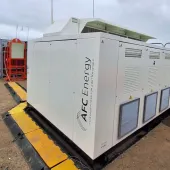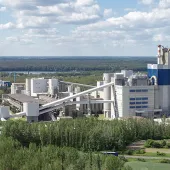Local MP helps BGS launch ‘living laboratory’
Low-carbon heating system to help meet BGS net-zero targets and provide data to the public
THE British Geological Survey (BGS) has broken ground on its geothermal heat pump project at its headquarters in Keyworth, Nottinghamshire, with the help of Ruth Edwards, MP for Rushcliffe.
The ground-source heat pump and living lab project is costing £1.7 million and is majority funded by the Natural Environmental Research Council (NERC) with a further contribution from the Government’s Public Sector Decarbonisation Scheme. The scheme is run by the Department for Energy Security and Net Zero and delivered by Salix Finance.
The renewable energy system will be the largest system of its kind in Rushcliffe, consisting of an array of 28 boreholes drilled to a depth of 225m. It will save approximately 30 tonnes of carbon dioxide (CO2e) per year and reduce the organization’s heating bill.
Forming part of BGS’s Keyworth campus decarbonization plans, the proposed system will involve the removal of greenhouse gas-emitting gas boilers and will heat two buildings on the Keyworth site, where more than 400 members of staff work, including tenants and non-BGS staff.
The heating system will also benefit from advanced monitoring, which will assess the running costs and efficiency of the heat pumps and provide a case study for other organizations, such as schools and hospitals, that are thinking of switching from fossil fuel boilers to clean heat pumps.
The project will constitute a ‘living laboratory’, with state-of-the-art sensors deployed in the heat extraction boreholes and buildings. The technology will provide data in real time to help increase the public’s understanding of ground-source heat pumps and how they can be an effective solution for heating both new and existing buildings in the UK.
As part of this project, BGS will also be taking rock samples for further analysis to help get a better understanding of the flow of heat and water underground. The type of geology at Keyworth means that this information is transferable to a large part of the UK, so the information generated will be of help to other, similar projects.
The installation of the ground-source heat pump is part of a wider project to help achieve UK Research and Innovation (UKRI)’s aim of reaching net zero by 2040. This also included the installation of 1,000 solar pnels above BGS’s car parking area in 2022.
To mark the installation of this technology and the ground-source heat pump, BGS invited local MP Ruth Edwards to the site where she met with senior staff, scientists, and members of the estates team to learn more about the project, as well as to see the borehole drilling taking place.
Ms Edwards said: ‘I was really honoured to be asked to break ground on the new geothermal heat pump at the British Geological Survey in Keyworth. This is a hugely exciting opportunity to help decarbonize the public sector estate. I’m thrilled that we are trialling the technology here in Rushcliffe and that the data generated by the trial will be used to inform other projects around the country.’
Mike Potter, senior environment manager at NERC, commented: ‘This inspiring project to decarbonize heat at the BGS Keyworth campus will reduce our reliance on fossil fuels. This is the first geothermal heat pump system to be installed on the UKRI estate and will support our journey to net zero in 2040. What makes this project extra special is the ‘living lab’ feature, which will support data collection and knowledge sharing that could inform the heat pump sector as a whole.’
Ian Rodger, director of programmes at Salix, said: ‘We are delighted to work with the British Geological Survey on this fascinating project. The state-of-the-art technology and the innovation being deployed is hugely exciting and the impact this will have on reducing carbon emissions is inspiring. We cannot wait to follow the project progress and see how a ‘living lab’ with all its detailed data collection will work and benefit this site and all the people who use it.’










